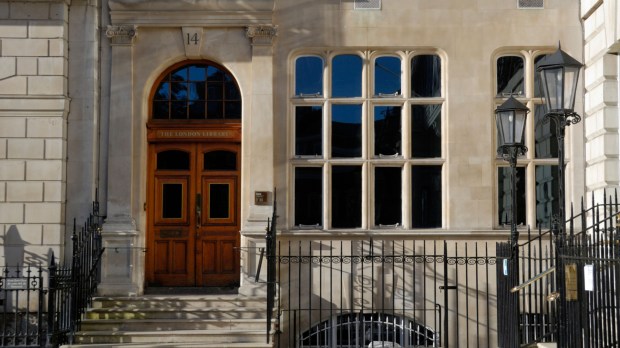Why have David Cameron and George Osborne overreached? Why are so many in their own party no longer disposed to obey them? Obviously the great issue of Europe has something to do with it. But there is another factor. Victory at the last election, followed by the choice of Jeremy Corbyn as Labour leader, has convinced too many Tories, including Mr Osborne himself, that they will be in power for ten more years at least. So they get careless and cocky. Then they make mistakes. Then they come up against the most admirable fact about parliamentary democracy, which is that you can never guarantee being in power for ten years. (You can’t even guarantee it for the prescribed five, though the iniquitous Fixed-term Parliament Act of the coalition has made this easier than before.) Once this is recognised, the patronage power of Mr Osborne starts to trickle away. Our first Prime Minister, Walpole, is supposed to have defined gratitude as ‘a lively sense of future favours’. Mr Osborne understands this sense well, and has worked hard to awaken it to advance his leadership bid. But what if people start believing that these favours may never be conferred on them? There isn’t much left.
Mr Duncan Smith’s resignation is a marvellous opportunity to reopen old European enmities. It is the small things that hurt. On Sunday, Sir John Major, just wheeled on by the ‘remain’ campaign for a major intervention, was to go on the Andrew Marr Show to talk about his article in that morning’s Sunday Telegraph. Imagine the fury of the former prime minister when he was bumped off by the former backbench rebel against him, IDS.
Operation Midland has at last closed down, in Holy Week. It has added an extraordinary chapter to the history of malice, mob-frenzy and credulity, which stretches back to Titus Oates, to the blood libel — indeed, to Golgotha. Some people will believe literally anything against others if whipped up to do so. Tom Watson, Labour’s deputy leader, should be carved into one of those grotesques depicting human vices which often appear on medieval misericords, his tongue protruding from his fat cheeks, representing Rumour. Part of the appeal of the story about the imagined paedophile ring in Dolphin Square was that it seemed to reveal an establishment conspiracy. But in fact, if only the establishment had been working properly, the police could have learnt almost at once that the story could not be true. The second most unbelievable allegation by the fantasist ‘Nick’ was that one Tory MP at some depraved party had sought to cut off the genitals of an abused boy until prevented by another Tory MP who was content with merely sodomising him. Even more incredible, however, was Nick’s claim that the man with the knife was Harvey Proctor and the man who stopped him was Sir Edward Heath. Anyone with any knowledge of the Tory tribe could have told the police that Mr Proctor, an out-and-out Powellite, could not stand Sir Edward, and that Sir Edward, assuming that he even recognised the existence of Mr Proctor, would never have deigned to speak to him, much less accompany him to an orgy. In the old days, the Chief Whip could have tipped off the head of the Met about this key improbability, saving millions of pounds and several unfairly ruined reputations.
Harvey Proctor, by the way, deserves particular praise. He had fewer friends in high places than the other accused because he is homosexual, lower-middle-class and right-wing. But he had the courage to announce publicly exactly what it was that the police were accusing him of. The blatant madness of the accusations — and the unfairness of Mr Proctor’s treatment — did much to turn the tide of opinion.
I have read a good many pieces by Labour supporters wringing their hands about Labour’s growing anti-semitism. Not one of them has contained the one word which is the key to this matter — Muslims.
In Cuba. , they are shouting: ‘¡Viva Obama! Viva Fidel!’ What a slogan. The FT headline ignorantly described this as a ‘Nixon in China’ moment: implying that Obama had previously been opposed to Castro’s Cuba. The US President is expected to come to Britain next month to order us to stay in the EU. Let us strew his way with palms. Let all of us — workers, peasants and soldiers — shout with one voice ‘¡Viva Obama! Viva Jean-Claude Juncker!’
Although acres of newsprint cover the race for the Republican nomination, strangely little explains the actual process. Yet in all contested leadership bids, the rules are what count. A useful piece by W. James Antle III of the Washington Examiner sheds light. Both the Republican establishment and the conservative movement do not want Donald Trump, though the wider grass roots do. When the Convention happens, the grass roots are in a weaker position, because the delegates tend to owe their positions to those above them. Under the rules, those mandated to vote for Trump because he won in their state are forced to do so only in the first round. If Trump does not achieve 50 per cent plus one in the first ballot (he is by no means there yet), it becomes a contested convention, with a second ballot. For that ballot, delegates can switch, and, if necessary, a completely new candidate could be drafted in. In that case, says Trump, his supporters would ‘riot’; but it could still happen.
When is one supposed to eat hot cross buns? They are for Good Friday not Easter, but Good Friday is a fast day. I find it very difficult to observe the fast in any case because Friday is the day I write my Daily Telegraph column and for that you need the energy that comes from eating. As I absolutely love hot cross buns — indeed, they are the only bun I ever eat — I am in a quandary. I suppose Holy Saturday is the one day of the year when I am allowed them.
Got something to add? Join the discussion and comment below.
Get 10 issues for just $10
Subscribe to The Spectator Australia today for the next 10 magazine issues, plus full online access, for just $10.
You might disagree with half of it, but you’ll enjoy reading all of it. Try your first month for free, then just $2 a week for the remainder of your first year.















Comments
Don't miss out
Join the conversation with other Spectator Australia readers. Subscribe to leave a comment.
SUBSCRIBEAlready a subscriber? Log in